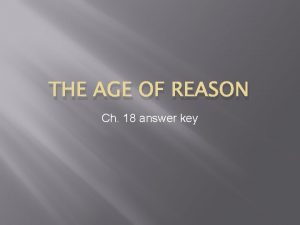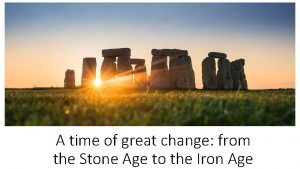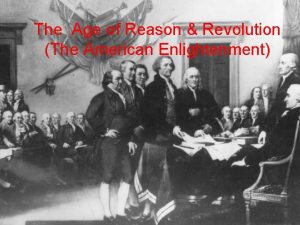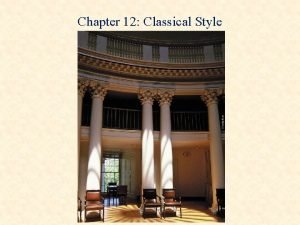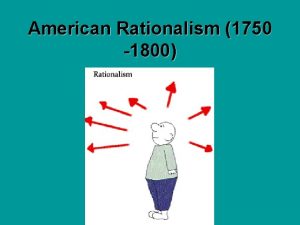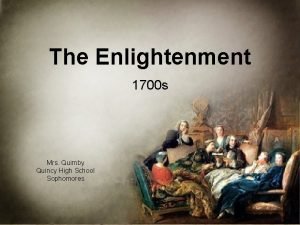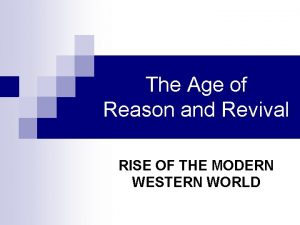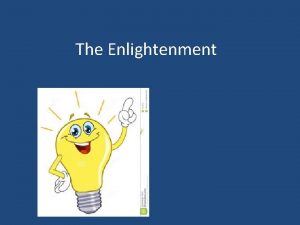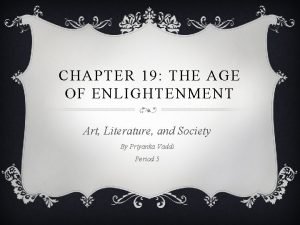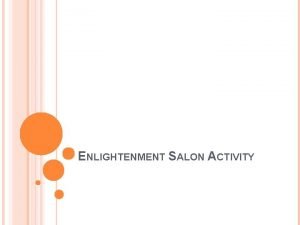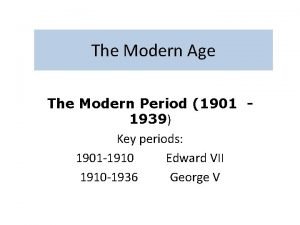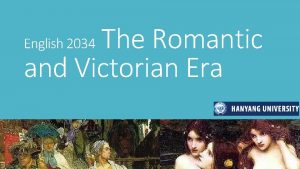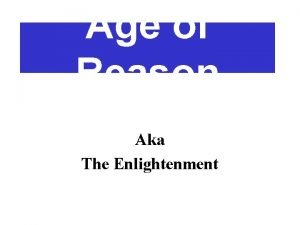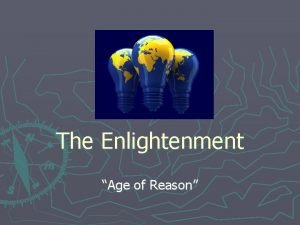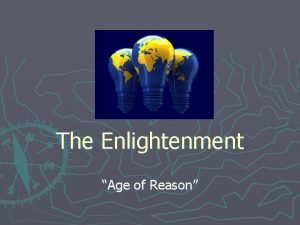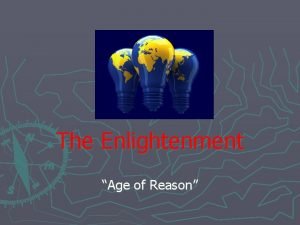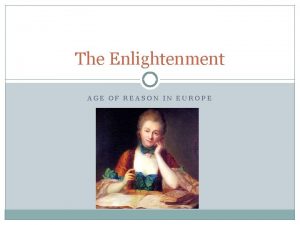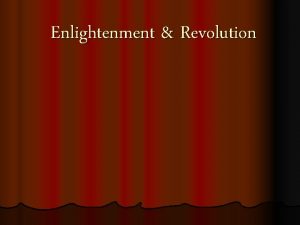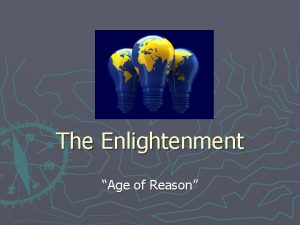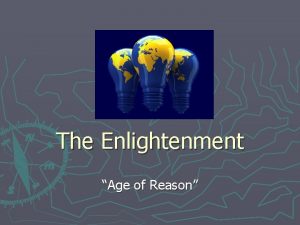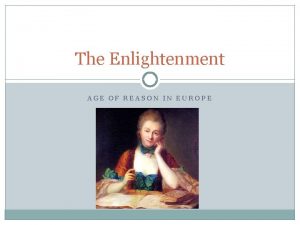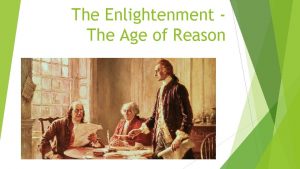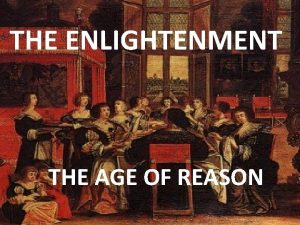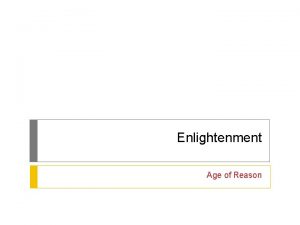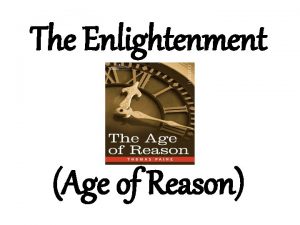The Enlightenment The Enlightenment Age of Reason The















- Slides: 15

The Enlightenment

The Enlightenment Age of Reason. The Neo-Classical Period. Emphasis on the power of the mind. Turn to Roman past for models. Change in the traditional social order: New commerce generated new wealth, new social class, new claims on social power. Importance of the social group and shared values over the individual in 18 th century society.

Main components Possibility of the existence, beyond ourselves, of an entirely rational physical and moral universe. The universe is fundamentally rational, it can be understood through the use of reason alone. Truth can be arrived at through empirical observation, the use of reason, and systematic doubt. Human experience is the foundation of human understanding of truth.

Main components Experience preferred over Authority; All human life, both social and individual, can be understood in the same way the natural world can be understood. Once understood, human life can be manipulated or engineered in the same way the natural world can be manipulated or engineered. Human beings can be improved through education and the development of their rational facilities.

Public vs. Private Life Public life mattered more than private life. Designated the realm of government and diplomacy. Occupations: encouraged oratory, travel, negotiation, exercise of political and economic power. French "salons“. Gatherings for intellectual conversations. Women presided. Role of women. They fill subordinate roles. Women’s role is in the home. Home life matters less than does public life. Role of literature - to delight and instruct its readers.

Isaac Newton Order of natural law. The universe can be explained completely through the use of mathematics. The universe operates in a completely rational and predictable way. One need not appeal to religion or theology to explain any aspect of the physical phenomena of the universe. Universe like a massive clock built by a god and set into motion.

Rene Descartes The mind is the source of individual being. One’s identity resides in one’s mind. What you think is more important than the outside physical world. Doubt everything. Basis of the scientific method. Truth can be derived at through empirical observation, the use of reason, and systematic doubt.

Religion Religious doctrines have no place in the understanding of the physical and human worlds Deism: No longer assumed God’s supervision of human affairs. Universe created by a rational being, and left it alone. One and only one God exists. God endowed the universe with natural moral and physical laws. Men endowed with rational nature.

Religion Separation of ethics from religion. Ethics understood as a matter of reason. “He that thinks reasonably must think morally. (Samuel Johnson)” Natural law requires man to lead moral life. The purest form of worship and the chief religious obligation is to lead a moral life. Although God created the universe, he does not interfere in its day to day running. Why Deism has not caught on as a major established view of religion?

Tolerance The greatest human crimes, as far as the philosophes were concerned, have been perpetrated in the name of religion and the name of God. A fair, just, and productive society absolutely depends on religious tolerance. This means not merely tolerance of varying Christian sects, but tolerance of non-Christian religions as well (for some philosophes ).

Other issues Every human being enters the world with all the same capacities. Education above all else is responsible forging the moral and intellectual characters of individuals. Education for every member of society. This view of education still dominates Western culture to this day. Human reason can be used to combat ignorance, superstition, tyranny, and dogma, and to build a better world.

Ancients vs. Moderns Quarrel between the Ancients and the Moderns in England France: Value of permanence vs. value of change. Conservative vs. liberal in our time. Ancients: Greece and Rome established standards applicable for all times and places. Moderns: The new more valuable than the old. Our view of the US Constitution?

Enlightenment in America Enlightenment provided the philosophical basis of the American Revolution was an enlightened concept of government. Leaders of the American Revolution influenced by English and French Enlightenment. Emphasis upon liberty, democracy, republicanism and religious tolerance. Reconcile science and religion, which resulted in a widespread rejection of prophecy and miracles.

Enlightenment in America Preference for Deism. The God of the Declaration of Independence is the same deist God worshiped by the philosophers of the Enlightenment, not the God of the traditional churches. Enlightenment thinking in Europe took place in the salons in Paris, the practical application of those ideas was carried out most vividly in the American colonies. Franklin believed an appeal to reason would provide solutions to all human problems.

Enlightenment in America Jefferson supported the separation of church and state. Jefferson believed educating people was a good way to establish an organized society. "A little rebellion, now and then, is a good thing, and as necessary in the political world as storms in the physical. . . It is a medicine necessary for the sound health of government. "
 The age of reason worksheet answers
The age of reason worksheet answers Iron age dates
Iron age dates Iron age bronze age stone age timeline
Iron age bronze age stone age timeline American age of reason
American age of reason It is called the age of reason
It is called the age of reason Rationalism in literature
Rationalism in literature It is called the age of reason
It is called the age of reason Age of revival
Age of revival Enlightenment ideas
Enlightenment ideas What is the enlightenment
What is the enlightenment Age of enlightenment art
Age of enlightenment art Salon discussion topics
Salon discussion topics Adrenarche
Adrenarche Conclusion of vedic period
Conclusion of vedic period Victorian age and modern age
Victorian age and modern age Romanticism vs victorianism
Romanticism vs victorianism
